Westward Expansion Unit Study
Even in a Charlotte Mason-inspired homeschool, I’ve found unit studies highly beneficial to learning. With lots of living books and meaningful project-based learning, this westward expansion unit study was an excellent way to learn history in our homeschool.
The time my children and I spent learning about pioneers during the westward expansion era was full of interesting topics. From cowboys and gold rushes to the Pony Express and exploration, we “covered so much ground” and enjoyed a trip back in time during our study.
As with most of our unit studies, this one was full of living books and included a healthy portion of project-based learning.

This post contains affiliate links.
Planning a Westward Expansion Unit Study
I plan most of our unit studies from scratch. If you’d like to learn how to do that, consider watching the video class I taught, How To Plan Effective Unit Studies.
For the westward expansion unit study, I worked hard to cover the era chronologically and as thoroughly as possible. While there might be a few holes here or there (or even some overlap), my upper elementary and middle school children soaked in much understanding about the time period.
What To Study About Westward Expansion
You will see people and events listed below in bold letters. They were the main topics we focused on during our unit study. After each person or event is listed in bold, you will see lists of other people or events. These topics were covered during our study but with less specific focus.
For example, our study began with a biography of Daniel Boone. We also took two local field trips to visit places significant to Daniel Boone. As we read and wandered, learning about and discussing pioneers, frontier boundaries after the Revolutionary War, the Wilderness Road, and the Northwest Ordinance were natural.
In many instances, we read other books, watched documentaries or YouTube videos, or had discussions to understand the “lesser topics.” These “rabbit trails” of learning helped my children learn important information without turning each interesting topic into a day’s worth of learning. This helps keep a unit study from becoming a beast while still including the important stuff.
Westward Expansion Order of Study
Daniel Boone – pioneers, frontier boundaries after the Revolutionary War, the Wilderness Road, Northwest Ordinance
Thomas Jefferson – the Louisiana Purchase
Lewis and Clark – the Northwest Passage, the nature journaling of plants and animals discovered, geographic barriers, cartography, the map of Native American tribes across North America
Sacagawea – Conestoga wagons, the Monroe Doctrine, the fur trade, the Oregon Fever
War of 1812 – maps of America & Great Britain, the disagreement over shipping & trade on seas – Embargo Act, Henry Clay, the battles in America & Canada, the Star Spangled Banner, the Treaty of Ghent
Jedediah Smith – the Oregon Trail, the Santa Fe Trail
Davy Crockett – the prairie schooner, Jason Lee, Independence Rock
Trail of Tears – the Indian Removal Act, Andrew Jackson, Cherokee history
Johnny Appleseed (John Chapman) – the six states created from 1816-1821, wagon groupings, the Pony Express
The Battle of the Alamo
Oklahoma Land Run
Chisholm Trail and Cowboys – Buffalo Bill, Ben Holladay, Annie Oakley, Wild Bill Hickok
Daily Unit Study Work
During our westward expansion unit study, each day looked somewhat similar to the next. Generally, I included at least a few of the following.
- Reading for research with notebooking
- Timeline and map work
- Reading for pleasure
- Working on one or more projects (project ideas below)
- Hands-on activity from Westward Ho!, Pioneer Days, or Wild West Days
Westward Expansion Living Books
Living literature is always a huge part of our history units. Each of these books greatly contributed to our westward expansion unit study. Some books we read as a family, some were assigned during individual reading time, and some were enjoyed as audiobooks in the car.
Westward Expansion Picture Books
Westward Expansion Chapter Books
Other Westward Expansion Resources We Used
Westward Expansion Project-Based Learning
After several weeks of fun activities, field trips, and daily lessons, we finished off our Westward Expansion unit with a “project week.” At the end of most of our units, I prepare a list of projects for my children to choose and complete. Each project requires a fair amount of research and assimilating the information into something that is presented to the family at the end of the week.
On Monday of our pioneer unit, I gave the kids a Westward Expansion Test and a project list (below), which would be completed by Friday. I don’t always give tests, but I like to surprise them once in a while with new methods of assessment. As for the projects, Caleb had to choose three, while Mahayla had to choose four. Besides math, a little grammar, and reading, projects were the only things on the schooling agenda during the week.
Project Choices:
Click on the image below to view and print the project list.
The Westward Expansion Unit Study Projects
Here’s what the kids came up with. As usual, I’m pleased and surprised at their ingenuity and eagerness to do a good job. Give ’em an inch, and they’ll take a mile – that’s a good thing in this case!
Mahayla: 6th Grade
She couldn’t decide, so chose to complete five instead. (Yes, I know.)
1. A diorama and file folder report on Lewis and Clark shared many facts learned during the unit study.

2. A quilt square handicraft project showed her how difficult it must have been for the pioneers to sew almost everything. She researched pioneer quilt squares on the internet and developed this one named “Oh Suzanna.” She completed the entire quilt square from start to finish without my help. Not bad for a first-timer, huh? My granny would be so proud!

3. She wrote a five-page report on Sam Houston, who happens to be in our family line. She had to interview my mom, who has done extensive genealogy research, and had to find information on her own.
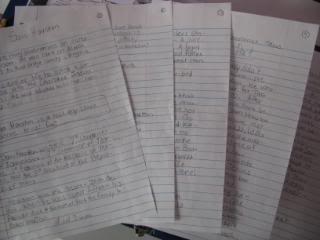
4. She prepared a yummy cowboy meal of chili and homemade crackers!
Homemade Crackers
1 c flour
1 tsp baking powder
pinch salt
1/2 cube butter
1/4 c milk
Preheat oven to 400 degrees. Mix flour, baking powder and salt. Use fork to mash butter in until it looks like crumbs. Add milk and stir until dough forms a ball. Sprinkle flour on counter and roll dough into a flat rectangle with a rolling pin. Use a knife to cut the dough into small squares. Place onto a greased cookie sheet and poke holes into the crackers with a fork. Bake for 9 minutes. Makes about 24 crackers.
5. She was Flying Sparrow in their original play, Cowboy and Indian. It was complete with five scenes, a playbill, and a script!
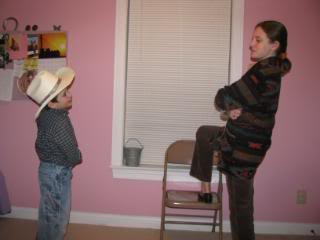
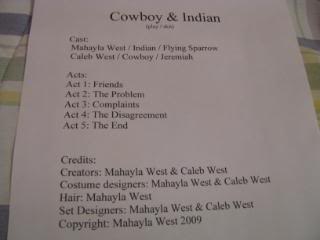
Caleb: 3rd Grade
In his usual fashion, he chose projects that required lots of hands-on and little writing. That’s okay, though, because he was still required to give a presentation about the projects. Even with very little writing, the information he gleaned and presented was very good.
1. He made a model of the Lewis and Clark keelboat using several of his toys around the house.
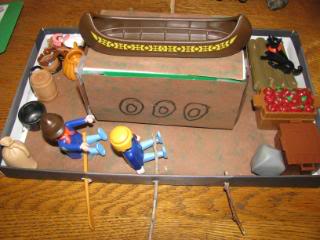
2. He made a 2nd model of the corner watchtower from a fort that might have been set up along one of the trails west. He said he would have built the whole fort but ran out of Lincoln Logs!
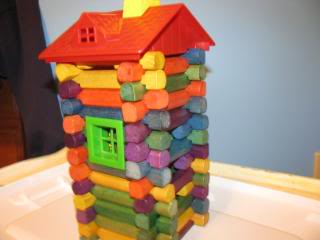
3. He was Jeremiah (with a great country accent) in their play “Cowboy and Indian.” As you can see, the play ended rather sadly. Jeremiah and Flying Sparrow couldn’t find a better way to solve their conflict except through guns. Maybe we watch too many Gunsmoke episodes on Sunday afternoons?
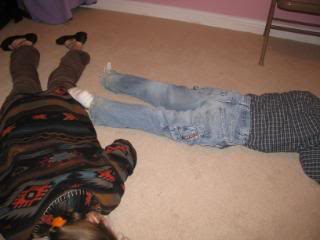
This concludes another fabulous unit study. We had fun, learned a ton, and made lots of memories. I will never regret these moments spent teaching my children.
You might enjoy these pioneer lessons, too!
Homemade Lewis and Clark JournalsLewis and Clark To-Scale Mapping
Lewis and Clark Day
More Fun Unit Studies





















![[ A GATHERING OF DAYS: A NEW ENGLAND GIRL'S JOURNAL, 1830-1832 ] By Blos, Joan W ( Author) 1990 [ Paperback ]](https://m.media-amazon.com/images/I/51cuIZyQGcL._SL500_.jpg)














I absolutely love this! May I use some of these ideas in my small (10 students) classroom, please?
Kathy, I hope you do use some of the ideas with your students! Have fun with your studies!
This is awesome!!! Thank you SO much for putting all this out here for the rest of us! Your kids seem to have enjoyed it-sure mine will too!
Thanks again!
D
Dawn, these are such good memories for us. Have fun making memories with your kiddos!
What resource did you use for timelines and mapping? Or did you just make it up based on researching and reading about each topic? Thanks!
JHancock, as we learned about each topic, we added notes in our ongoing timeline book. When it made sense, I copied a blank map from Uncle Josh’s Outline Map Book for my children to show journeys or mark events.
About how long did you do this Westward Expansion Unit? I know it varies depending on the children’s interests, but I’m just curious. By the way, thank you so much for all of the info you put on you site. It is such a blessing!
Sumer, I believe we spent about six weeks on this study. 🙂
Cindy, these are such great ideas! Thank you for sharing. Did you use any type of “spine” to cover this time period (e.g. Story of the World, Abraham Lincoln’s World, etc)?
Thank you, Amber! Sadly, I never found quite the right spine for this study. I patched together the books mentioned along with some extra internet research or YouTube documentaries as needed to keep a nice thread of learning throughout. 🙂
Is this unit available for purchase? I love that it is literature based.
Thanks
I’m sorry. It’s not. I’m glad you like it, though!
For those interested in a recent publication of a middle-grade historical fiction book about the Oregon Trail, check out “California Trail Discovered,” published by WordCraftsPress. The fictional character of thirteen-year-old Daniel Whitcomb travels West with the historical figure of James Savage (who, later becomes one of the first whites to enter Yosemite Valley) as they battle both good and bad whites, good and bad Indians. Along the trail, Daniel becomes friends with twelve-year-old Virginia Reed, a member of the Donner Party. She helps him realize the importance of friendship and family, but they part ways when her group falls behind the rest of Daniel’s wagon train. Based on historical events, this novel pulls young readers into the drama of westward expansion as experienced through the eyes of those who lived it.